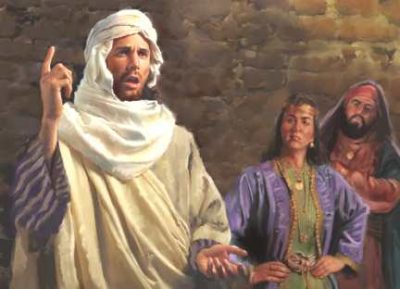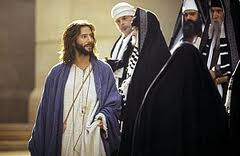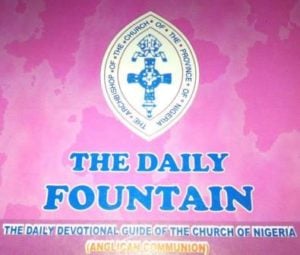Liturgical Readings for : Friday, 5th July, 2024
Friday of the Thirteenth Week in Ordinary Time, Year 2
Optional memorial of St Anthony Zaccaria, priest
FIRST READING
A reading from the book of the Prophet Amos 8:4-6. 9-12
I will bring famine on the country, a famine not of bread, but of hearing the word of the Lord.
Listen to this, you who trample on the needy and try to suppress the poor people of the country, you who say,
‘When will New Moon be over so that we can sell our corn, and sabbath, so that we can market our wheat?
Then by lowering the bushel, raising the shekel, by swindling and tampering with the scales,
we can buy up the poor for money, and the needy for a pair of sandals, and get a price even for the sweepings of the wheat.’

”That day –it is the Lord who speaks-
I will make the sun go down at noon, and darken the earth in broad daylight.
I am going to turn your feasts into funerals, all your singing into lamentation;
I will have your loins all in sackcloth, your heads all shaved.
I will make it a mourning like the mourning for an only son,
as long as it lasts it will be like a day of bitterness.’
See what days are coming–it is the Lord who speaks- days when I will bring famine on the country, a famine not of bread, a drought not of water,
but of hearing the word of the Lord.
They will stagger from sea to sea, wander from north to east, seeking the word of the Lord and failing to find it.’
The Word of the Lord. Thanks be to God.
Responsorial Psalm Ps 118
Response Man does not live on bread alone but on every word that comes from the mouth of God.
1. They are happy those who do his will, seeking him with all their hearts. ‘
I have sought you with all my heart: let me not stray from your commands. Response
2. My soul is ever consumed in longing for your decrees.
I have chosen the way of truth with your decrees before me. Response
3. See, I long for your precepts: then in your justice, give me life.
I open my mouth and I sigh as I yearn for your commands. Response
Gospel Acclamation Ps 24: 4. 5
Alleluia, alleluia!
Teach me your paths, my God, make me walk in your truth.
Alleluia!
or Mt 11: 28
Alleluia, alleluia!
Come to me, all you who labour and are overburdened,
and I will give you rest, says the Lord.
Alleluia!
GOSPEL
The Lord be with you. And with your spirit
A reading from the holy Gospel according to Matthew 9: 9-13 Glory to you, O Lord
It is not the healthy who need the doctor, but the sick. What I want is mercy, not sacrifice.
As Jesus was walking he saw a man named Matthew sitting by the customs house, and he said to him,
‘Follow me.‘ And he got up and followed him.

While he was at dinner in the house it happened that a number of tax collectors and sinners
came to sit at the table with Jesus and his disciples. When the Pharisees saw this, they said to his disciples,
‘Why does your master eat with tax collectors and sinners?
‘When he heard this he replied,
‘It is not the healthy who need the doctor, but the sick.
Go and learn the meaning of the words: What I want is mercy, not sacrifice.
And indeed I did not come to call the virtuous, but sinners.’
The Gospel of the Lord. Praise to you, Lord Jesus Christ.
********************
Gospel Reflection Friday Thirteenth Week in Ordinary Time Matthew 9:9-13
The call of Matthew, the tax collector, suggests that the Lord does not see someone’s profession or former way of life as a block to their becoming his disciple and sharing in his mission. As Paul declares in his first letter to the Corinthians, ‘God chose what is low and despised in the world, things that are not, to reduce to nothing things that are’ (1 Cor 1:28). The Lord is like the fisherman who casts a very wide net that brings in all sorts of fish or like the sower who scatters seed with abandon so that it falls on all sorts of ground. Matthew may have been an unlikely candidate to become a member of Jesus’ inner circle, but according to the gospel reading, ‘he got up and followed him’.
The Pharisees were scandalized at the kind of people with whom Jesus shared table. Yet, the gospels suggest that Jesus had a very broad table. He was ready to share table with the religious leaders and with those the religious leaders considered sinners. Jesus knew that all were sinners and in need of God’s mercy. All were alike in that regard. What distinguished them was their awareness of their need of God’s mercy and their openness to receive this gift from Jesus. Jesus also expected those who received God’s mercy to be merciful in their dealings with others. Such a merciful attitude to others was lacking in the Pharisees, even though this was clearly revealed to be God’s will in the Scriptures they cherished, ‘What I want is mercy, not sacrifice’ (Hosea 6:6). In celebrating God’s mercy, as Jesus did at table with tax collectors and sinners, we are called to share with others the mercy we celebrate.
________________________________
The Scripture Readings are taken from The Jerusalem Bible, published 1966 by Darton, Longman & Todd Ltd.







![#KingdompadiMusicVid: James Akinwumi | Our God [@MinisterjamesOF]](https://www.kingdompadi.com/wp-content/uploads/2025/03/WhatsApp-Image-2025-03-03-at-15.05.04_acb15277-150x150.jpg)




